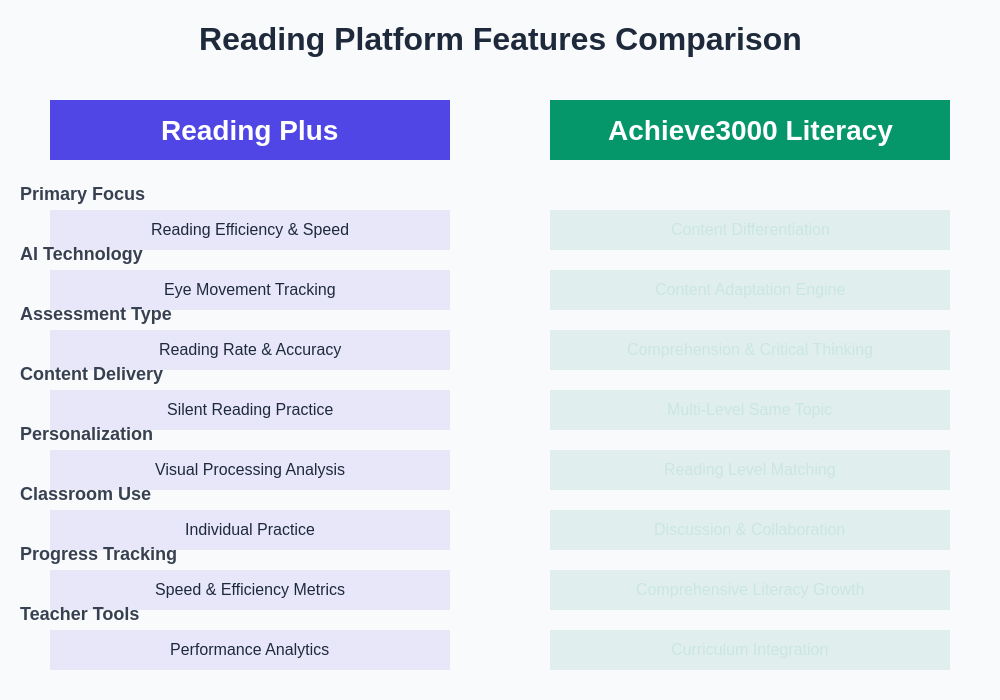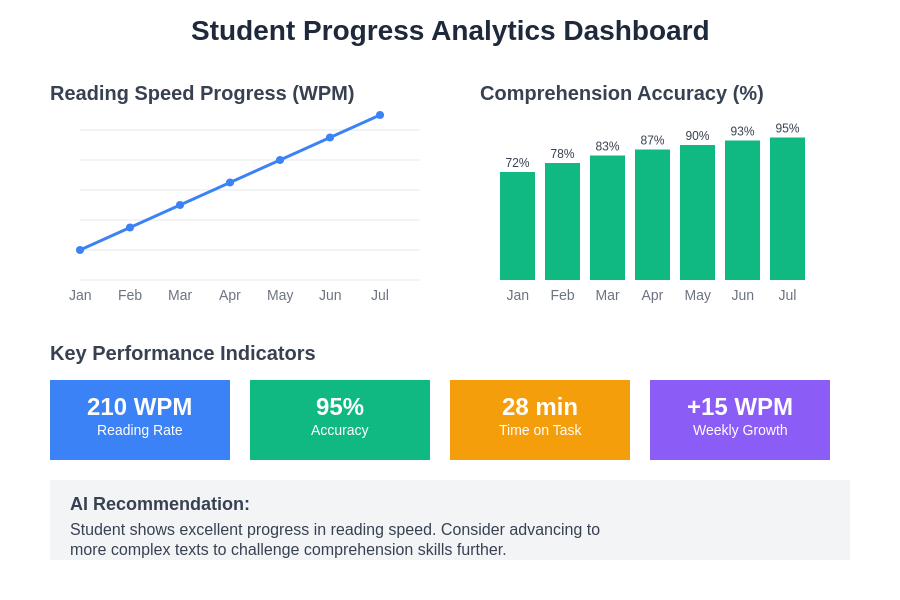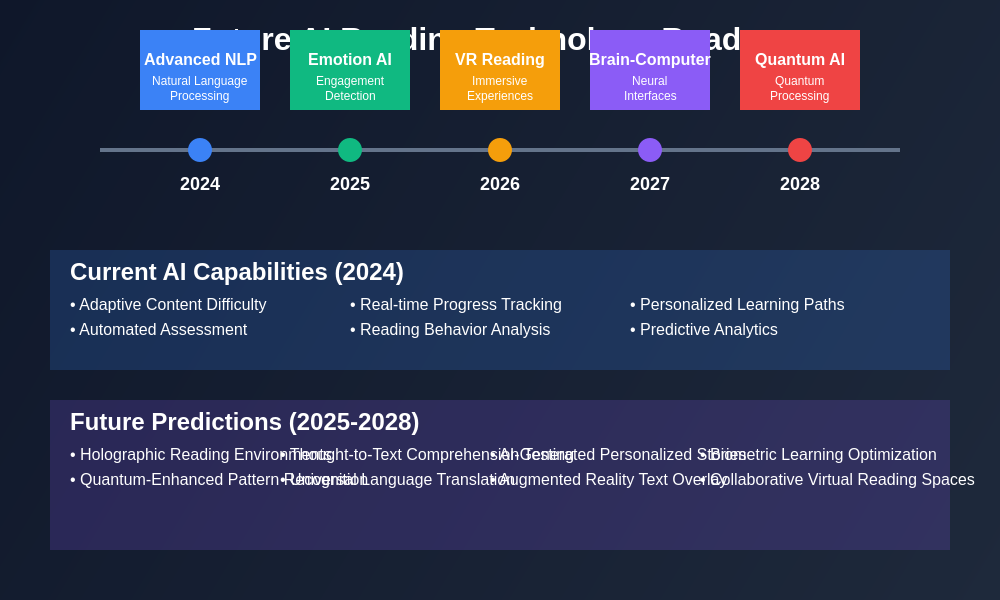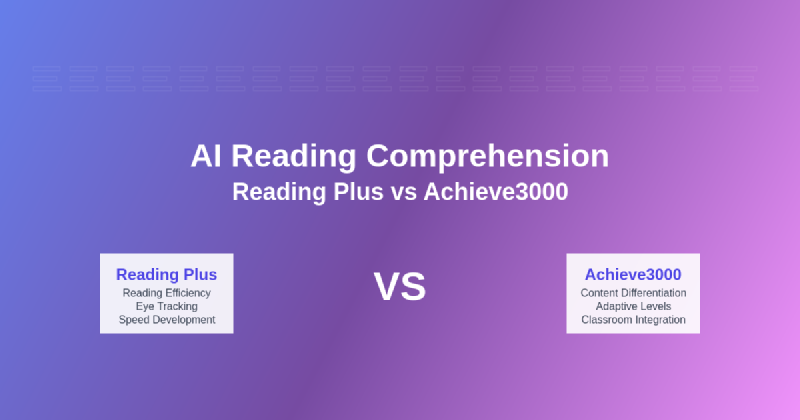The educational landscape has been fundamentally transformed by artificial intelligence technologies that are revolutionizing how students develop critical reading comprehension skills. Among the most prominent platforms leading this transformation are Reading Plus and Achieve3000 Literacy, two sophisticated AI-powered systems that have redefined literacy education through personalized learning experiences, adaptive assessment methodologies, and data-driven instructional strategies that cater to individual student needs and learning preferences.
Explore the latest AI educational trends to understand how artificial intelligence is reshaping classroom learning and student engagement across diverse educational environments. The integration of AI into reading comprehension instruction represents a significant evolution from traditional one-size-fits-all approaches to highly personalized learning experiences that adapt in real-time to student performance, engagement levels, and comprehension abilities.
Understanding AI-Powered Reading Comprehension
The application of artificial intelligence to reading comprehension education has created unprecedented opportunities for personalized learning that addresses the unique challenges faced by individual students in developing critical literacy skills. Unlike traditional reading programs that rely on static content and uniform pacing, AI-powered platforms like Reading Plus and Achieve3000 Literacy leverage sophisticated algorithms to analyze student reading behaviors, comprehension patterns, and engagement metrics to create customized learning pathways that optimize educational outcomes.
These advanced systems utilize machine learning algorithms to continuously assess student performance across multiple dimensions, including reading speed, comprehension accuracy, vocabulary development, and critical thinking skills. The real-time analysis of student interactions with reading materials enables these platforms to make immediate adjustments to content difficulty, pacing, and instructional strategies, ensuring that each student receives the optimal level of challenge and support necessary for sustained academic growth.
Reading Plus: Comprehensive Reading Development Platform
Reading Plus has established itself as a leading force in AI-powered reading instruction through its comprehensive approach to developing both reading efficiency and comprehension skills simultaneously. The platform employs sophisticated eye-movement tracking technology combined with adaptive learning algorithms to create personalized reading experiences that address the fundamental mechanics of reading while building comprehension abilities through carefully curated content selections.
The platform’s unique approach focuses on developing reading rate and visual processing skills alongside traditional comprehension instruction, recognizing that efficient reading mechanics are essential foundations for deeper comprehension abilities. Students engage with leveled texts that automatically adjust based on their demonstrated proficiency levels, while embedded assessment tools provide continuous feedback on both speed and accuracy metrics that inform ongoing instructional decisions.
Reading Plus distinguishes itself through its emphasis on silent reading development, recognizing that most academic and professional reading occurs silently rather than aloud. The platform’s sophisticated tracking systems monitor student eye movements and reading patterns to identify areas where students may struggle with visual processing, word recognition, or comprehension integration, enabling targeted interventions that address specific skill deficits.
Enhance your educational technology stack with Claude to leverage advanced AI capabilities for curriculum development, assessment design, and personalized learning experiences. The integration of multiple AI tools creates comprehensive educational ecosystems that support both teaching and learning through intelligent automation and data-driven insights.
Achieve3000 Literacy: Differentiated Instruction Excellence
Achieve3000 Literacy has revolutionized reading comprehension instruction through its sophisticated differentiation engine that automatically adjusts content complexity based on individual student reading levels while maintaining consistent learning objectives across all ability levels. This approach ensures that every student engages with grade-appropriate concepts and skills while reading materials that match their current comprehension abilities, creating inclusive learning environments where all students can succeed.
The platform’s strength lies in its ability to deliver the same high-quality content at multiple reading levels, enabling classroom discussions and collaborative learning experiences where students have engaged with identical concepts despite reading materials of varying complexity. This differentiation strategy maintains academic rigor while ensuring accessibility, allowing teachers to facilitate meaningful discussions and activities that incorporate diverse student perspectives and understanding levels.
Achieve3000’s comprehensive assessment system provides detailed insights into student growth across multiple literacy dimensions, including reading comprehension, vocabulary development, writing skills, and critical thinking abilities. The platform’s predictive analytics capabilities enable educators to identify students who may be at risk of falling behind and implement targeted interventions before academic gaps become significant obstacles to learning.
Comparative Analysis of AI Technologies
The artificial intelligence technologies employed by Reading Plus and Achieve3000 Literacy represent different but complementary approaches to personalized reading instruction. Reading Plus utilizes advanced biometric tracking and visual processing analysis to optimize the mechanics of reading, while Achieve3000 focuses on content adaptation and differentiated instruction to ensure comprehension development across diverse ability levels.
Reading Plus’s AI algorithms excel in analyzing micro-level reading behaviors, including fixation patterns, regression frequencies, and processing speeds, to identify specific areas where students may benefit from targeted skill development. This granular analysis enables the platform to provide precise interventions that address fundamental reading efficiency issues that may impact overall comprehension performance.
Achieve3000’s artificial intelligence capabilities center on content analysis and adaptation, utilizing sophisticated natural language processing to maintain semantic consistency while adjusting vocabulary complexity, sentence structure, and conceptual density. This approach ensures that students engage with appropriately challenging materials while maintaining exposure to grade-level concepts and academic vocabulary essential for educational success.
Assessment Methodologies and Progress Monitoring
Both platforms employ sophisticated assessment strategies that leverage artificial intelligence to provide comprehensive insights into student learning progress, though their approaches differ significantly in scope and methodology. Reading Plus emphasizes continuous monitoring of reading behaviors and mechanical skills, providing detailed analytics on reading rate development, visual processing improvements, and comprehension accuracy trends over time.
The platform’s assessment system generates detailed reports that enable educators to track individual student progress across multiple dimensions while identifying patterns and trends that may indicate areas requiring additional support or intervention. These analytics capabilities extend beyond simple performance metrics to include engagement indicators, effort levels, and learning preference insights that inform instructional decision-making.
Achieve3000’s assessment methodology focuses on comprehensive literacy skill development, utilizing adaptive testing protocols that adjust question difficulty based on student responses while maintaining consistent measurement standards. The platform’s assessment system provides detailed insights into reading comprehension growth, vocabulary acquisition, and critical thinking skill development through sophisticated item response theory models that ensure accurate and reliable measurement of student abilities.

The comprehensive feature comparison reveals distinct strengths and capabilities across both platforms, with Reading Plus excelling in reading mechanics and visual processing development while Achieve3000 demonstrates superior content differentiation and classroom integration capabilities. Understanding these differences enables educators to select platforms that best align with their specific instructional goals and student needs.
Personalization and Adaptive Learning Features
The personalization capabilities of both Reading Plus and Achieve3000 Literacy represent sophisticated applications of artificial intelligence that create truly individualized learning experiences for students across diverse ability levels and learning preferences. These adaptive systems continuously analyze student performance data to make real-time adjustments to content selection, difficulty levels, and instructional strategies that optimize learning outcomes for each individual student.
Reading Plus’s personalization engine focuses primarily on optimizing reading efficiency and visual processing skills through adaptive exercises that respond to individual student needs and progress patterns. The platform’s AI algorithms analyze reading behaviors to identify specific areas where students may benefit from targeted practice, automatically adjusting exercise difficulty and focus areas to ensure optimal challenge levels that promote skill development without causing frustration or disengagement.
Achieve3000’s personalization approach centers on content adaptation and differentiated instruction, utilizing sophisticated algorithms to match students with reading materials that align with their current ability levels while maintaining exposure to grade-appropriate concepts and academic vocabulary. This personalization strategy ensures that students remain challenged and engaged while building the foundational skills necessary for academic success across subject areas.
Discover research capabilities with Perplexity to enhance educational content development and assessment design through comprehensive information gathering and analysis. The integration of AI research tools supports evidence-based instructional practices and data-driven decision making in educational environments.
Implementation Strategies and Classroom Integration
Successful implementation of AI-powered reading comprehension platforms requires careful consideration of classroom dynamics, technology infrastructure, and teacher preparation to ensure seamless integration with existing instructional practices. Both Reading Plus and Achieve3000 Literacy offer comprehensive implementation support that includes teacher training, curriculum alignment guidance, and ongoing technical assistance to maximize platform effectiveness and student engagement.
Reading Plus implementation typically involves establishing regular practice schedules that allow students to engage with the platform’s reading efficiency exercises while maintaining connections to classroom reading instruction and curriculum objectives. The platform’s reporting capabilities enable teachers to monitor student progress and identify areas where additional support may be needed, facilitating targeted interventions that complement platform-based learning experiences.
Achieve3000 implementation focuses on integrating differentiated reading experiences into existing curriculum frameworks, enabling teachers to assign readings that align with classroom topics while ensuring that all students engage with appropriately challenging materials. The platform’s discussion tools and collaborative features support classroom conversations and activities that build on individual reading experiences while promoting peer learning and knowledge sharing.
Student Engagement and Motivation Factors
Student engagement represents a critical factor in the success of AI-powered reading comprehension platforms, as sustained motivation and active participation are essential for achieving meaningful learning outcomes. Both Reading Plus and Achieve3000 Literacy incorporate sophisticated engagement strategies that leverage gamification elements, progress tracking, and achievement recognition to maintain student interest and motivation throughout extended learning experiences.
Reading Plus employs engaging visual interfaces and progress tracking systems that help students visualize their improvement in reading speed and comprehension accuracy over time. The platform’s achievement system recognizes student progress and effort, providing motivation for continued engagement while building confidence in reading abilities. Interactive exercises and varied content selections maintain student interest while promoting skill development across diverse reading contexts.
Achieve3000’s engagement strategies focus on relevant, high-interest content that connects to current events, student interests, and real-world applications. The platform’s discussion features and collaborative activities promote social learning experiences that enhance engagement while building critical thinking and communication skills. Achievement tracking and progress monitoring tools help students understand their growth and set goals for continued improvement.
Data Analytics and Reporting Capabilities
The sophisticated data analytics and reporting capabilities of both platforms provide educators with comprehensive insights into student learning progress, engagement patterns, and areas requiring additional support or intervention. These analytics tools transform raw performance data into actionable insights that inform instructional decision-making and enable targeted interventions that address specific student needs.
Reading Plus generates detailed reports that track reading rate development, comprehension accuracy, and visual processing improvements over time, enabling educators to identify trends and patterns that may indicate areas requiring additional focus or support. The platform’s analytics capabilities extend to engagement metrics and effort indicators that provide insights into student motivation and participation levels.
Achieve3000’s reporting system provides comprehensive insights into reading comprehension growth, vocabulary development, and critical thinking skill progression through sophisticated data visualization tools that make complex information accessible and actionable for educators. The platform’s predictive analytics capabilities enable early identification of students who may be at risk of falling behind, facilitating proactive interventions that prevent academic gaps from becoming significant obstacles.

The comprehensive analytics dashboards provided by both platforms enable educators to monitor individual student progress while identifying classroom-wide trends and patterns that inform instructional planning and resource allocation decisions. These data-driven insights support evidence-based teaching practices that optimize learning outcomes for all students.
Professional Development and Teacher Support
Effective utilization of AI-powered reading comprehension platforms requires comprehensive teacher preparation and ongoing professional development that enables educators to maximize platform capabilities while integrating technology seamlessly with established instructional practices. Both Reading Plus and Achieve3000 Literacy provide extensive training resources and support systems that help teachers develop the knowledge and skills necessary for successful platform implementation.
Reading Plus offers comprehensive training programs that focus on understanding platform capabilities, interpreting student data, and integrating reading efficiency instruction with existing classroom practices. The platform’s professional development resources include webinars, instructional guides, and ongoing support from educational specialists who help teachers maximize platform effectiveness while addressing implementation challenges.
Achieve3000 provides extensive teacher training that emphasizes differentiated instruction strategies, data interpretation skills, and curriculum integration techniques that enable seamless platform adoption within existing educational frameworks. The platform’s professional development offerings include ongoing coaching support, collaborative learning communities, and resource libraries that support continuous improvement in platform utilization and instructional effectiveness.
Cost Considerations and Value Propositions
Educational technology investments require careful consideration of cost-effectiveness and return on investment, particularly in resource-constrained educational environments where budget limitations may restrict technology adoption. Both Reading Plus and Achieve3000 Literacy offer different pricing models and value propositions that appeal to diverse educational contexts and implementation scenarios.
Reading Plus typically employs per-student licensing models that scale based on enrollment numbers and implementation scope, with pricing structures that may include setup fees, training costs, and ongoing support services. The platform’s value proposition centers on comprehensive reading skill development that addresses both efficiency and comprehension through integrated assessment and instruction systems.
Achieve3000’s pricing structure often includes site licensing options that may provide cost advantages for larger implementations, with comprehensive support services and curriculum integration assistance included in platform licensing agreements. The platform’s value proposition emphasizes differentiated instruction capabilities and classroom integration features that enhance existing curriculum resources while providing comprehensive reading comprehension support.
Research Evidence and Effectiveness Studies
The effectiveness of AI-powered reading comprehension platforms has been extensively studied through rigorous research methodologies that examine student learning outcomes, engagement levels, and long-term academic impact. Both Reading Plus and Achieve3000 Literacy have participated in independent research studies that provide evidence for their effectiveness in improving student reading comprehension and overall literacy development.
Research studies examining Reading Plus effectiveness have demonstrated significant improvements in reading rate and comprehension among participating students, with particular benefits observed among students who initially demonstrated below-grade-level reading abilities. Longitudinal studies have shown sustained improvement in reading skills that transfer to improved performance across academic subject areas.
Achieve3000 effectiveness research has documented substantial gains in reading comprehension, vocabulary development, and critical thinking skills among students who regularly engage with platform activities. Independent studies have demonstrated that students using Achieve3000 show greater improvement in standardized reading assessments compared to control groups using traditional reading instruction methods.
Future Developments and Innovation Trends
The continued evolution of artificial intelligence technologies promises to bring even more sophisticated capabilities to reading comprehension platforms, with emerging developments in natural language processing, machine learning, and educational data analytics creating new opportunities for personalized learning experiences. Both Reading Plus and Achieve3000 Literacy continue to invest in research and development initiatives that will enhance their platform capabilities and educational effectiveness.
Future developments may include more sophisticated content generation capabilities that create personalized reading materials based on individual student interests and learning objectives, advanced assessment tools that provide real-time feedback on comprehension strategies, and enhanced collaboration features that facilitate peer learning and knowledge sharing among students.
The integration of emerging technologies such as virtual reality, augmented reality, and advanced speech recognition may create new opportunities for immersive reading experiences that enhance engagement and comprehension while providing additional modalities for content delivery and assessment.

The technological roadmap for AI-powered reading comprehension platforms indicates continued innovation in personalization algorithms, assessment methodologies, and content delivery systems that will further enhance the effectiveness of digital literacy instruction while maintaining focus on evidence-based educational practices.
Making the Right Choice for Your Educational Context
Selecting between Reading Plus and Achieve3000 Literacy requires careful consideration of specific educational goals, student needs, technology infrastructure, and implementation resources available within individual educational contexts. Both platforms offer unique strengths and capabilities that may align differently with various instructional objectives and student populations.
Educational leaders should consider factors such as existing curriculum frameworks, teacher preparation levels, technology support capabilities, and budget constraints when evaluating platform options. Additionally, pilot programs and trial implementations can provide valuable insights into platform effectiveness and compatibility with existing educational practices before making long-term commitments.
The decision-making process should also include consideration of long-term educational goals, scalability requirements, and alignment with district or institutional technology initiatives that may influence platform selection and implementation success. Comprehensive evaluation of platform capabilities, support services, and research evidence will ensure informed decision-making that maximizes educational impact and return on investment.
Conclusion
The comparison between Reading Plus and Achieve3000 Literacy reveals two sophisticated AI-powered platforms that offer distinct but complementary approaches to reading comprehension instruction. Reading Plus excels in developing reading efficiency and visual processing skills through biometric tracking and adaptive exercises, while Achieve3000 Literacy demonstrates superior content differentiation and classroom integration capabilities that support inclusive learning environments.
Both platforms represent significant advances in educational technology that leverage artificial intelligence to create personalized learning experiences that adapt to individual student needs and learning preferences. The choice between these platforms should be based on specific educational objectives, student populations, and implementation contexts that align with platform strengths and capabilities.
The continued evolution of AI-powered reading comprehension platforms promises to bring even more sophisticated capabilities to literacy education, creating new opportunities for personalized learning experiences that enhance student engagement and academic achievement while supporting teachers with data-driven insights and instructional resources that optimize educational outcomes for all students.
Disclaimer
This article is for informational purposes only and does not constitute professional educational advice. The comparisons and evaluations presented are based on publicly available information and general understanding of educational technology platforms. Educational institutions should conduct their own thorough evaluations, including pilot programs and stakeholder consultations, before making technology adoption decisions. Platform features, pricing, and capabilities may vary and change over time. Readers should verify current information directly with platform providers and consider their specific educational contexts when making implementation decisions.
